The Environmental Extremes Lab has invested in a new LED lighting system for our environmental chamber to enable our students to embark upon some innovative and fun research investigations around altering perception and how this might influence behavioural thermoregulation and exercise performance.

Over the years we have directed some of our thermally-based research towards the investigation of altering the perception of the heat stress being experienced. Danny White, a former BSc sport and exercise science student of ours and now at Portsmouth University in Professor Mike Tipton’s environmental extremes team, carried out his dissertation study (supervised by now Professor Paul Caslte, Castle et al., 2012), using incorrect visual feedback of ambient and core temperature in the heat to test the hypothesis that deception would alleviate the decrement in cycling performance compared to a no deception trial. Seven males completed three 30 min cycling time trials in a randomised order on a Kingcycle ergometer in a temperate (21.8°C/43%rh), hot (31.4°C/64%rh) and deceived (31.6°C/65% rh, but participants thought it was 26°C/60%rh) condition. In this study, deception improved performance in the heat by creating a lower RPE, evidence of a subtle mismatch between the subconscious expectation and conscious perception of the task demands.
In that study, one of our former Principal Technicians, Alan Allchorn, designed an innovative computer programme that would add to the deception of heat stress, with participants constantly in view of incorrect information about core temperature in the deception trial. In the hot and temperate conditions, participants received true rectal temperature values, but during the deception trial, a core temperature value that was 0.3°C lower than the true value was entered by experimenters to be seen by participants. A simple, but novel way to add to the deception!
 We continued research along this line of enquiry through two subsequent dissertation projects that investigated whether deception of preheating and body core temperature would alter self-paced 5K running in the heat (led by Charlotte Woolf) and whether deception of precooling and heat rate would alter self-paced 5K running in the heat (led by Daniel McVeigh). In both studies, we were able to show that when deceiving participants’ perception of their thermal state, reinforced by either an altered thermal (i.e. via core temperature), or in the precooling study, an altered cardiovascular strain (i.e. via heart rate), this in turn altered 5K running in the heat. The first study was presented by Dr Neil Maxwell at the 2010 British Association of Sport and Exercise Science Annual Conference in Glasgow with the slides below for interest.
We continued research along this line of enquiry through two subsequent dissertation projects that investigated whether deception of preheating and body core temperature would alter self-paced 5K running in the heat (led by Charlotte Woolf) and whether deception of precooling and heat rate would alter self-paced 5K running in the heat (led by Daniel McVeigh). In both studies, we were able to show that when deceiving participants’ perception of their thermal state, reinforced by either an altered thermal (i.e. via core temperature), or in the precooling study, an altered cardiovascular strain (i.e. via heart rate), this in turn altered 5K running in the heat. The first study was presented by Dr Neil Maxwell at the 2010 British Association of Sport and Exercise Science Annual Conference in Glasgow with the slides below for interest.
The second study was presented as a poster by Daniel at the British Association of Sport and Exercise Science Annual Student Conference in 2011.
 Therefore, the implication of these studies, is correct knowledge of internal and external temperature could be important for athletes, otherwise they may underperform if they perceive a greater heat load exists. This could be worth mentioning to the front of house GB support staff who greet our Olympic and Paralympic athletes in Tokyo 2020 each morning, reminding them that if they reinforce the extent of the heat stress it could influence athletes’ perception and subsequent performance. The other side to the coin is that ethically, we must be mindful that deceiving athletes of either the true heat stress, or their true heat strain could result in a masking of heat illness symptoms.
Therefore, the implication of these studies, is correct knowledge of internal and external temperature could be important for athletes, otherwise they may underperform if they perceive a greater heat load exists. This could be worth mentioning to the front of house GB support staff who greet our Olympic and Paralympic athletes in Tokyo 2020 each morning, reminding them that if they reinforce the extent of the heat stress it could influence athletes’ perception and subsequent performance. The other side to the coin is that ethically, we must be mindful that deceiving athletes of either the true heat stress, or their true heat strain could result in a masking of heat illness symptoms.
We must also remember that elite athletes are a unique breed who in a competitive environment and in pursuit of success can often block some of the cues that would normally encourage us lesser trained individuals to ease off the pace or even stop exercising to prevent a heat related illness. Recent work by Dr Jo Corbett at Portsmouth University completed a really nice study that showed competition to change the relationship between perceived and actual thermophysiological state, by altering behavioural thermoregulation and increasing thermophysiological strain. A consequence they highlighted was that it could increase heat-illness risk. How could we forget the race where Jonny Brownlee was helped over the line by his older brother Alistair, before collapsing from exertional heat stroke.
Then, more recently in the 2018 Commonwealth Games, Scottish marathon runner Callum Hawkins also collapsed from exertional heat stroke.
The seminal research of Dr Zac Schalder and Associate Professor Andreas Flouris has changed our thinking around the regulation of behavioural thermoregulation and the model below is a common feature in our undergraduate and postgraduate teaching of the subject.
 Proposed model of behavioural thermoregulation as described by Flouris and Schlader (2015) – Human behavioral thermoregulation during exercise in the heat. Andreas gives a really nice presentation that I have directed many of my students towards and would encourage others to watch. Zac has also written a really nice subsequent review entitled, Regulation of body temperature by autonomic and behavioral thermoeffectors to complement the first.
Proposed model of behavioural thermoregulation as described by Flouris and Schlader (2015) – Human behavioral thermoregulation during exercise in the heat. Andreas gives a really nice presentation that I have directed many of my students towards and would encourage others to watch. Zac has also written a really nice subsequent review entitled, Regulation of body temperature by autonomic and behavioral thermoeffectors to complement the first.
In addition to teaching around the theme of behavioural thermoregulation, our own research has been able to benefit from their work, resulting in a few recent publications linked to sport and health populations.
James, Carl, Hayes, Mark, Willmott, Ashley, Gibson, Oliver, Flouris, Andreas, Schleder, Zachary and Maxwell, Neil (2017) Defining the determinants of endurance running performance in the heat Temperature, 4 (3). pp. 314-329.
James, Carl, Richardson, Alan, Willmott, Ashley, Watt, Peter, Gibson, Oliver and Maxwell, Neil (2017) Short-term heat acclimation and precooling, independently and combined, improve 5 km running performance in the heat Journal of Strength and Conditioning Research.
Waldock, K., Hayes, M., Watt, P. and Maxwell, N.S. (2018). Physiological and perceptual responses in the elderly to simulated daily living activities in UK summer climatic conditions Public Health, 161, pp.163-170.
Last year, one of our MSc Applied Environmental Physiology Module self-designed study groups from our MSc Applied Sport Physiology degree investigated the influence of virtual cooling and heating on thermal perception and time trial performance in a hot environment. In this study, which was inspired by Dr Ash Willmott (now at Anglia Ruskin University), a small number of participants carried out a 15 min time trial under stress conditions (32°C/50%rh) while watching a Cold Video – David Attenborough Frozen Planet Series 1, Winter; a Hot Video – David Attenborough Africa Series 1, Kalahari, or no video. Small participant numbers prevented inferential statistics from being used, but virtual cooling from the cold video lowered thermal perception and RPE and there was an indication that distance covered was greater in the 15 min time trial in the cold video compared to when the hot video was watched! Although taking an exploratory case study design approach, this was a really innovative study that allowed our students to examine human behavioural thermoregulation and its impact on exercise performance from a different perspective.
With the new LED light system in our environmental chamber now, we have one of our self-designed MSc groups currently investigating whether behavioural thermoregulatory responses associated with exercising in a warm environment can be altered by the use of visual deception (i.e. through changes in ambient lighting altering mood). Our students are taking different perspectives, some are approaching the research question from a sports performance perspective, while others with a health setting in mind. We look forward to designing some more exciting and innovative experiments to enhance our understanding of how exercise is regulated in hot environments in the future. A huge thanks to Bill Norton, one of our technicians and members of our Environmental Extremes Lab, who made this possible and that I am sure will inspire a good number of our students in years to come.








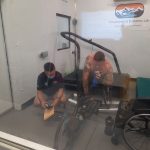


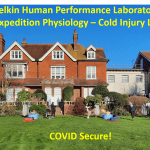








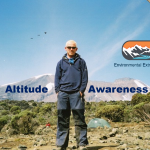
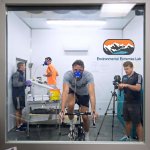

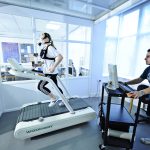






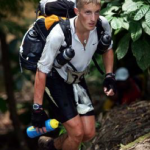


May 12, 2019 at 8:19 am
Fantastic achievement EEL team….Congrats The Savorys
November 20, 2021 at 6:46 am
You wrote this article very well. Very knowledgeable. Thanks for sharing this article
Visit dreamteach.co.uk!